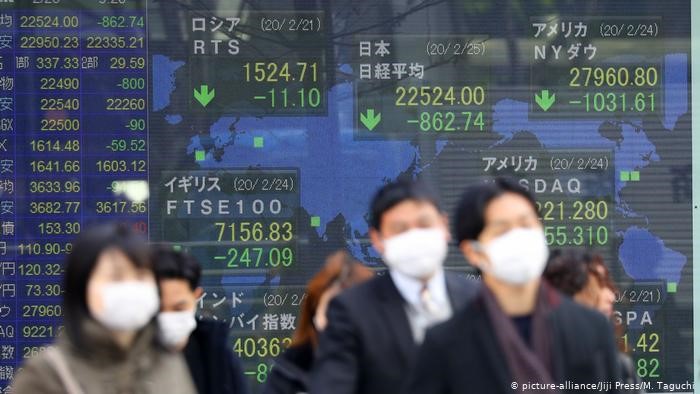– Martin Sokol –
What will be the economic consequences of the pandemic? Are we heading for a wide-spread economic collapse? Is a global financial meltdown coming? In the current fast-evolving situation, it is difficult to predict how this will end. One thing is increasingly clear though: the hope that economic life will quickly return to normal once the health emergency has passed, is fading away. Will this unprecedented situation force us to rethink the ways in which our economic and financial systems are organised? My fear is that unless a fundamental paradigm shift is adopted, the coming crisis will further exacerbate social inequalities and deepen economic disparities at multiple geographical scales, while also failing to put us on a sustainable development path.
In terms of the immediate economic impact, it appears that we are entering unchartered waters. While an economic slowdown has been predicted, the speed and severity of the economic collapse in the leading economies have taken many by surprise. Worries grow that instead of a recession (technically defined as two consecutive quarters of falling output) we may be heading for a depression – a much more serious, longer-term crisis. Comparisons have already been drawn with the Great Depression of the 1930s. One of the most striking and visible aspects of this economic calamity is a dramatic increase in unemployment in all major economies.
The realisation that this crisis is threatening the entire economic edifice has been reflected in the policy responses seen so far. Indeed, the massive government spending in countries such as the US and UK is being matched by colossal interventions of their central banks. It is likely that, without such decisive actions, financial markets may have already collapsed – demonstrating just how central the central banks really are in sustaining contemporary financialised economies.
The economic response of the Eurozone to the pandemic threat did not get off to the best of starts. The EU’s economic response to Covid-19 thus for now basically mirrors the fragmented and uncoordinated response to the health emergency itself. Without ‘coronabonds’, each EU member state is left on its own devices when it comes to borrowing money to fight the pandemic’s economic fallout. Some countries hold first-class and other countries second-class rescue tickets – duly reflecting the uneven economic geography of Europe. This uneven geography is likely to be further exacerbated by the pandemic.
A big concern here is that if Europe itself is incapable of finding a common ground in dealing with this unprecedented emergency, there is little hope that a consensus will be found at a global level. This is extremely bad news because while the economic impact of the pandemic on the advanced economies of the Global North is likely to be massive, the impacts on the Global South will be catastrophic. Indeed, emerging and developing economies have a much weaker capacity to deal with either the health crisis or the economic one. The twin crises will most likely feed off each other, with devastating impacts. Meanwhile, as workers everywhere are being asked to stay put, capital has been moving freely around the globe – mostly from the Global South to the Global North – rapidly abandoning the sinking ship in a capital flight of unprecedented scale. This will sink developing economies ever faster. The financial outflows will trigger a range of knock-on effects. Worries grow that a global ‘debt deluge’ may be unavoidable. There is a high risk that many indebted countries in the Global South will simply not be able to repay their debts. This, combined with a word-wide pile of corporate debt that has accumulated since the last crisis but now may be defaulted on, will threaten the stability of the global financial system. A financial meltdown cannot be ruled out. Finance may not be where this crisis started, but it may be where it will end.
Will this force us to rethink the ways in which our economic and financial systems are organised? The post-pandemic instinct of policy-makers will be to try to return to ‘normal’ as soon as possible. But going back to ‘normal’ will mean continuing an economic and financial system that creates grotesque inequalities (both social and spatial) and that is bringing us ever closer to environmental collapse. Returning from the Covid-19 emergency back to ‘normal’ would be returning straight to global climate emergency. If there is one positive thing about the pandemic, it is that it showed that governments can take brave decisions and adopt measures that would previously have been unthinkable. We need to find new ways of organising our societies – societies where ‘the economy’ is not at odds with humanity and the environment. As Nelson Mandela would remind us, “it always seems impossible until it is done”.
[Note: This is an abridged version of a GEOFIN blog “From a pandemic to a global financial meltdown? Preliminary thoughts on the economic consequences of Covid-19” which can be read in full here: https://geofinresearch.eu/blogs/geofin-blog-9-from-a-pandemic-to-a-global-financial-meltdown-preliminary-thoughts-on-the-economic-consequences-of-covid-19-by-martin-sokol/]
Martin Sokol is Associate Professor in Geography at Trinity College Dublin, Ireland, and Principal Investigator of GEOFIN research. GEOFIN is funded by the European Research Council (ERC) Consolidator Grant under the European Union’s Horizon 2020 research and innovation programme (Grant Agreement No. 683197).

